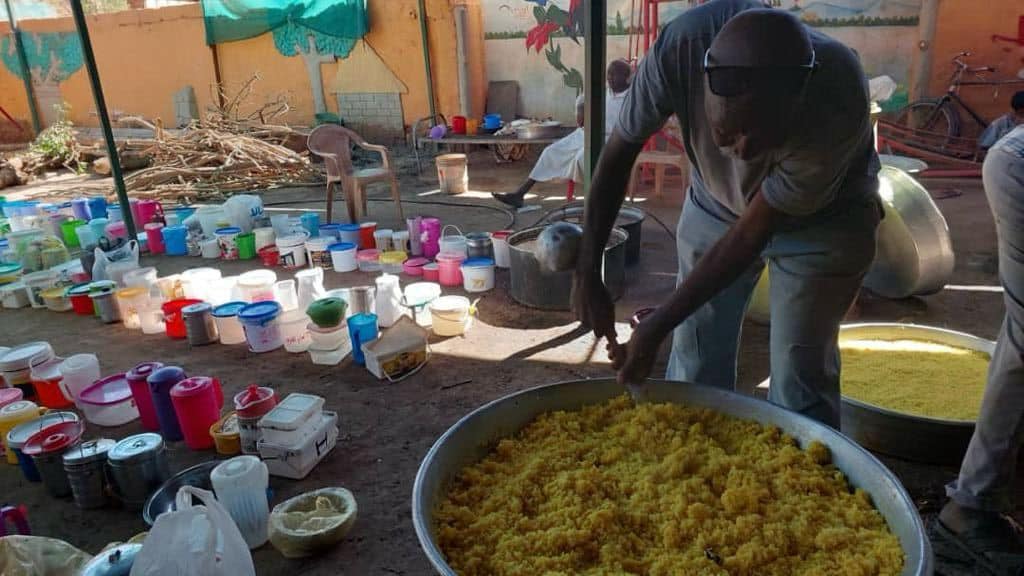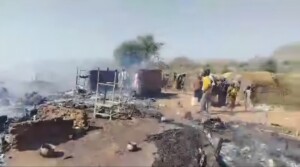Charity kitchens in Sudan capital resume activities ‘thanks to huge efforts of volunteers’

A soup kitchen in Khartoum state (File photo: Hadhreen FB page)
The Sudanese Hadhreen organisation reported yesterday that it managed to restore communication with 21 of the 25 charity kitchens it is supporting in Khartoum state. Volunteers are forced to travel to Shendi, 80 kilometres north of Khartoum, where Internet connections are working again, to receive donations to the kitchens transferred via banking apps.
Hadhreen is not the only group supporting so-called community kitchens in the three cities of Khartoum state: Omdurman, Khartoum, and Khartoum North (Khartoum Bahri). The Khartoum Emergency Room reported in the last week of February that the communications blackout that began in the region in end January has forced 221 of the about 300 community kitchens to suspend their charity work, leaving people in the three cities without access to food.
The three main communication and internet providers in Sudan broke down in end February. Most parts of Darfur and Kordofan have been experiencing months-long blackouts, forcing people to use Starlink satellite communication network, the rest of Sudan remains for a large part cut off from the outer world for nearly 40 days. Providers Sudani and Zain in end February returned to states under control of the Sudanese Armed Forces (SAF). The blackout persists, however, in Khartoum, El Gezira, and large parts of Kordofan and Darfur.
The outages caused a severe cash crisis in the country, as banking applications could not be used anymore. This meant not only a large blow to all the Sudanese receiving financial support from relatives or friends abroad but also to those who were depending on organisations like Hadhreen, which depends on donations.
The charity kitchens, established by activists in Khartoum state after the war erupted in April last year, are also unable to investigate and aid emergency cases.
Last week, the emergency room said that approximately 240,000 families in Khartoum state were threatened with severe hunger, saying that “the closed kitchens were the only refuge for those who have no breadwinners and no food”.
‘Complex circumstances’
Kamal Moez, a member of Hadhreen (meaning ‘[we are] present’ in Arabic), told Radio Dabanga on Wednesday that the 25 soup kitchens supported by his organisation were providing food to approximately 3,000 people in Khartoum before the communications networks were interrupted.
“The people in Khartoum state are living in extremely complicated conditions,” he said. “They have been besieged by the Rapid support Forces (RSF) since the war broke out [in April last year], and face difficulty in movement and lack any job opportunities.
“Most of them depend entirely on the soup kitchens for their survival. So we were very happy when we managed to restore communication with 21 kitchens at the beginning of Ramadan on Sunday evening.”
“Our kitchens resumed service in El Haj Yousef, El Jereif East, and El Wadi El Akhdar in Sharg El Nil (East Nile) locality in Khartoum North, where we provide complete meals for breaking the daily fasting, and meals for those who are unable to fast, the sick, children, and Christian families, in addition to kitchens in the El Sawrat neighbourhoods in Omdurman, and in Burri, El Jereif West, and Soba West in Khartoum,” Moez continued.
“We plan to serve the neighbourhoods of Shambat and El Mazad [in Khartoum North] and El Sahafa [in Khartoum] soon as well, aiming to reach 5,000 people.”
‘Extreme difficulties’
Most community kitchens “provide a complete meal during the fasting month of Ramadan, with juice each day, while other kitchens only serve fava beans.
Regarding the difficulties facing the work of the kitchens, Moez mentioned the scarcity of food due to the closure of most markets, the interruption of the communications and Internet networks, “though the Starlink satellite network does help”, and the security risks for the volunteers moving from one neighbourhood to another.
“The volunteers are making tremendous efforts to provide service to the people in Khartoum state, and to coordinate the work between the kitchens and the beneficiaries,” he said. “We really need safe corridors for aid to reach all areas affected by the violence.”
Hadhreen receives support from the Sadaqat Society, Hayat Organisation, the Sudanese American Medical Association (SAMA) in the USA, the Sudanese community in New Zealand, and Supporters of Hadhreen.
One meal daily
The spokesperson for the Khartoum state Emergency Room, Hind El Ta’if, told Radio Dabanga that the emergency rooms, set up by the resistance committees in the neighbourhoods of Khartoum, Omdurman, and Khartoum North after the war broke out, have been working hard to continue providing meals to families in homes and shelter centres.
“When aid was delayed due to the interruption of the communications networks, many emergency rooms began to buy food from merchants on credit,” she explained.
“The rooms are now forced to transfer any financial support intended for other purposes to food to suffice the families during the current fasting month of Ramadan,” she said. “They are working hard to provide one meal per day to the families, which is not enough but better than nothing.”
“The conditions in Bahri and Sharg El Nil (East Nile) localities in Khartoum North are in particular dire, as it is difficult for the volunteers there to obtain food supplies. As for Omdurman, there are difficulties in communicating with the emergency rooms due to the blackout.”
The emergency rooms have been able to restart a number of kitchens “thanks to the support from charities and philanthropists abroad and some humanitarian organisations,” El Ta’if noted. “Members of the emergency rooms are forced to travel from Khartoum to Shendi, 80 kilometres north of Khartoum, where Internet connections are working again, to receive donations transferred through banking apps.”











 and then
and then